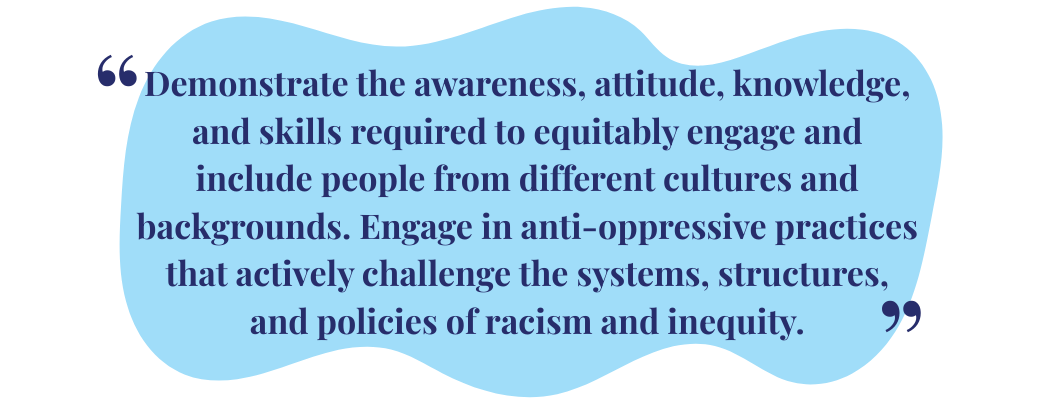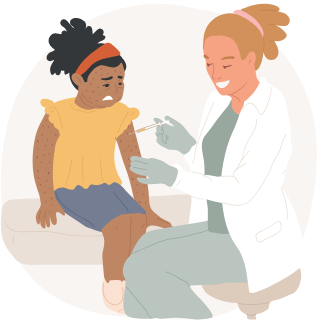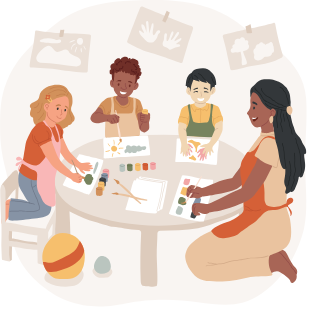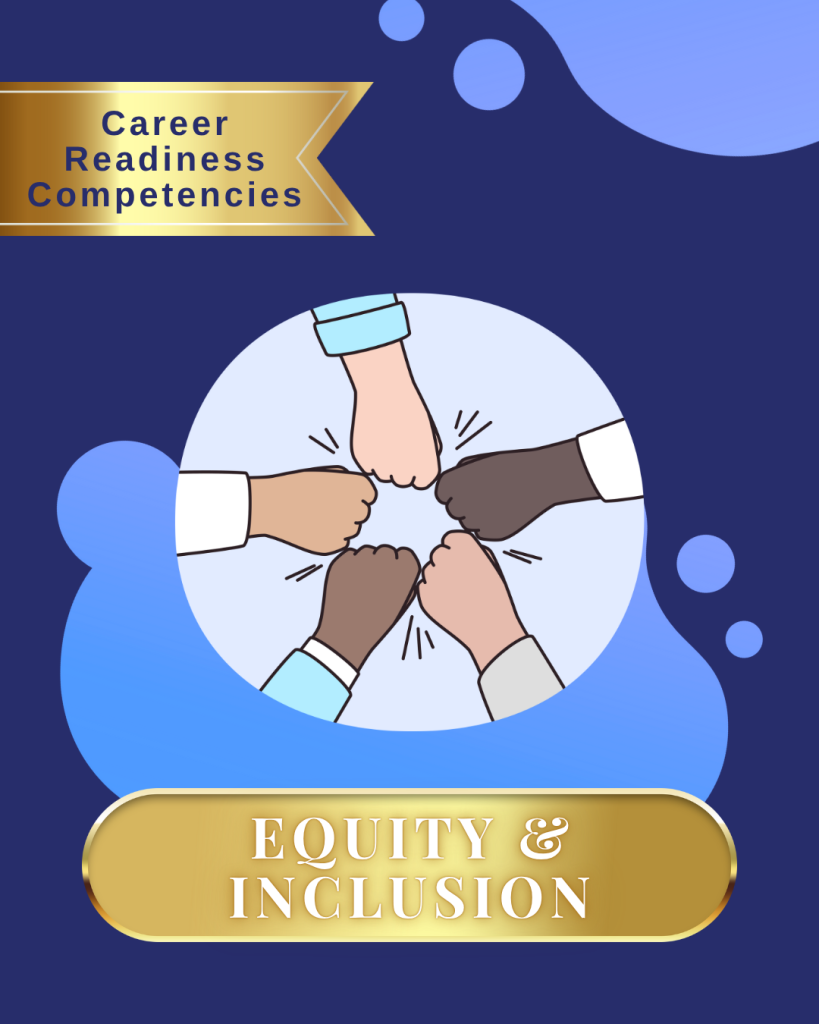In a diverse, global society, the ability to work with people from different backgrounds and lived experiences is not just a nice-to-have—it’s essential. In this fourth installment of our Career Readiness Competency series, we’re exploring Equity & Inclusion, a competency that centers on building awareness, challenging bias, and creating welcoming environments where all people can thrive. As defined by the National Association of Colleges and Employers (NACE), centering equity and inclusion allows one to:

Prioritizing equity and inclusion is about more than just intention—it’s about action. Every day, students and professionals have opportunities to grow in this area, whether by advocating for others, examining their own perspectives, or contributing to change in their communities or workplaces.
Sample Behaviors and Real-World Examples
| Solicit and use feedback from multiple cultural perspectives to make inclusive and equity-minded decisions. |
➨ |
Listening to others—especially those with different experiences—is critical. In the workplace, this skill shows up in inclusive decision-making, community engagement, and customer-centered design. |
| Actively contribute to inclusive and equitable practices that influence individual and systemic change. |
➨ |
Small actions matter. That might mean participating in an employee resource group, pushing for accessible learning materials, or sharing resources that support historically marginalized communities. |
| Advocate for inclusion, equitable practices, justice, and empowerment for historically marginalized communities. |
➨ |
Students in education, healthcare, or business programs can do this by focusing capstone projects or papers on disparities in their field, mentoring others, or using their voices to support policy or institutional changes that improve equity. |
| Seek global cross-cultural interactions and experiences that enhance one’s understanding of people from different demographic groups and that lead to personal growth. |
➨ |
At Aspen, you’re already interacting with people from different time zones, cultures, and walks of life. Taking time to get to know your classmates and instructors—and being intentional in how you relate to them—is a meaningful way to grow cross-cultural understanding. |
| Keep an open mind to diverse ideas and new ways of thinking. |
➨ |
Engaging with ideas that differ from your own builds flexibility and insight. In the classroom, that could mean reading research from different global contexts or challenging your own assumptions. In the workplace, it means approaching collaboration with curiosity and respect. |
| Identify resources and eliminate barriers resulting from individual and systemic racism, inequities, and biases. |
➨ |
This might look like helping a colleague navigate accessibility tools, recommending inclusive language updates to documents, or simply pointing others to support services. Equity often starts with noticing what’s missing—and stepping in to help fill the gap. |
| Demonstrate flexibility by adapting to diverse environments. |
➨ |
Whether you’re learning in a multicultural classroom or working in a global team, adaptability is key. Students are building this skill every time they adjust their communication styles or collaborate across time zones and disciplines. |
| Address systems of privilege that limit opportunities for members of historically marginalized communities. |
➨ |
In education, healthcare, and business, students and professionals alike can question “the way things have always been done.” From equity audits to inclusive hiring practices, change happens when people ask better questions—and push for better answers. |
Why Diversity, Equity & Inclusion Matter in Every Field
 |
In Business: Inclusive teams are more innovative, make better decisions, and serve customers more effectively. Leaders who prioritize equity and cultural competence are better prepared to manage global markets and diverse workforces. |
| In Health Sciences & Healthcare: Equity in healthcare is critical to improving patient outcomes. Culturally responsive care leads to greater trust, better communication, and more ethical health practices. |  |
 |
In Education: Inclusive classrooms foster belonging, engagement, and academic success. Educators trained in equity are more equipped to support diverse learners and to challenge structural barriers in the system. |
Practicing Equity & Inclusion at Aspen University
The Aspen community is uniquely positioned to support this competency. Students collaborate with classmates, faculty, and staff from across the country—and often the globe. Learning how to work with people from different perspectives is woven into the online experience.
As a student, you might already be practicing equity and inclusion when you:
- Show respect for differing viewpoints in discussion forums
- Explore systemic disparities in assignments and research
- Use inclusive language in written communication
- Ask thoughtful questions of classmates from different backgrounds
- Advocate for equitable access and representation in your field
These experiences translate directly into your professional life—and help you become not just career-ready, but community-ready, too.
Additional Resources
Aspen scholars know the importance of equity and inclusion, and many have dedicated their time researching the topic. Below is a collection of presentations by Aspen faculty, students, and graduates that explore equity and inclusion.
Fall Research Colloquium 2024 – Dr. Karen Ofafa, “Understanding the Nursing School Admission Process from the Perspective of Minority Students and Administrators” Recording Link
Faculty Speaker Series 2022 – Stephen Molchan
- The Importance of Financial Literacy- Introducing the challenges the LGBTQ+ community faces when it comes to personal finances which include the pay gap, access to housing, credit, family planning, cost of living, and retirement. Recording Link
- Opportunities for financial professionals to make their practices more inclusive of the LGBTQ+ community. Recording Link
Faculty Speaker Series 2023 – Dr. Nina Beaman, “Be a JEDI (justice, equity, diversity, inclusion)”
- What is JEDI? Recording Link
- What do JEDI warriors do? Recording Link
- What successes do JEDI warriors have? Recording Link
Fall Research Colloquium 2022 – Dr. Linda Haen, “Nurse Educators and Implicit Bias: Can Critical Reflection Change Practice?” Recording Link
Spring Research Colloquium 2022 – Dr. Colleen Marzilli, “Cultural Competence in Pre-Licensure Nursing Students” Recording Link
Spring Research Colloquium 2022 – Dr. Linell Kam, “Cultural-Sensitive Education and Its Actualization” Recording Link
Faculty Speaker Series 2021 – Dr. Colleen Marzilli, “Culture, Diversity, Equity and Inclusion”
- Cultural Competence Recording Link
- Disparities Recording Link
- Diversity and Inclusion Recording Link
- Implicit Bias Recording Link
Faculty Speaker Series 2021-2022 – Dr. Andrea Reed, “Fostering LGBTQ+ Inclusivity in the Clinical Setting”
- LGBTQ+ Recording Link
- Nursing Recording Link
- Transformational Leadership Recording Link
- Structural Empowerment Recording Link
Faculty Speaker Series 2022 – Stephen Gregory, “Understanding Culture Through Folk and Fairy Tales”
- America – The Rugged Individual and The Underdog Recording Link
- The Far East – Honor, Patience, and Self-Respect Recording Link
- Europe – We Are All Alike – Except When We’re Not Recording Link
- Middle East and India – Life is Hard and Really Hard Recording Link
Faculty Speaker Series 2022 – Dr. Doraine Baul-Pinson, “Implications of Nation Attachment for African Americans”
- Expanding on attachment theory Recording Link
- Making the case for Nation Attachment Recording Link
- Classification, Maltreatment, Patriarchy Recording Link
- Moving toward Inclusion Recording Link
At Aspen University, we believe education is one of the most powerful tools for building a more equitable future. Our programs are designed to help students develop the mindset, knowledge, and skills that today’s employers value and that the world needs.
Explore our programs today and take the next step toward a meaningful career.
Jump to the other Career Readiness Competencies:
Overview
Career & Self Development
Communication
Critical Thinking
Equity & Inclusion
Leadership
Professionalism
Teamwork
Technology

